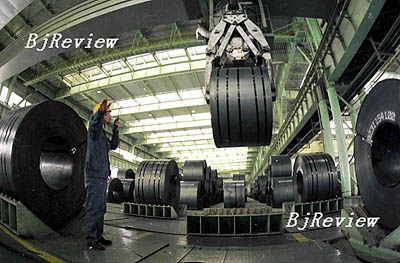|

On February 25, Shanghai-based Baosteel Co. Ltd., the largest steel producer in China, announced a price hike of 800 yuan ($114.3) per ton of steel for the second quarter of 2008. Days later on March 19, it ramped up the cost of its steel futures by 300 yuan ($42.9) per ton for May.
The company's frequent moves on prices show it is straying from its old method of pricing quarterly.
Baosteel claimed that quarterly repricing had lost pace with the market and put the company in a bind. And more frequent price adjustments would reduce the difference in steel prices between Baosteel and its overseas competitors.
On February 18, Japanese steel producer Nippon and its South Korean partner POSCO met an agreement with Brazilian company Vale, the world's largest iron ore producer, to raise the benchmark prices of two major iron ores by 65 percent and 71 percent respectively for the fiscal year of 2008. This has triggered a collective upward march of global steel prices. The domestic price also shot higher. Around 10 days after the result of the negotiation on iron ore prices was released on February 18, the composite price on the domestic iron and steel market edged up 400-450 yuan ($57.1-64.3) per ton, posting a growth rate of 8.4-8.7 percent.
On the heels of Baosteel, China's other major steel producers, including Wusteel and Anshan Steel, said they would follow suit.
Qi Xiangdong, Executive Vice Secretary-General of China Iron and Steel Association, pointed to the price surge as an inevitable trend, driven simultaneously by escalating iron ore prices and the ever-increasing demand of buoyant domestic construction and automobile industries.
The impact of the spikes in iron and steel prices will inevitably move downstream for end-producers to digest, and the automobile and appliance industries are bound to feel the brunt. Every 1,100-yuan ($157.1) rise per ton of iron and steel will add around 1,500 yuan ($214.3) to the production costs of every automobile, whose weight averages 1.4 tons. Surviving fierce price wars in recent years, most automobile manufacturers have run out of steam to further slash their prices. Compared with a few years ago, it's no longer possible for them to harvest windfalls. Low-end automobiles rake in too little profits to reassure their manufacturers over the swelling costs of raw materials.
Manager Wang of the Beijing Hyundai 4S Workshop contended that Beijing Hyundai, taking account of cutthroat market competition, is not likely to follow the footsteps of steel producers. Long-term contracts inked by some automobile manufacturers with iron and steel suppliers bar steel prices from floating in tandem to market fluctuations. As a result, their production costs will stay flat in a short time. On the other hand, even though steel now costs more, automobile manufacturers will institute countermeasures to suppress total production costs in a drive to cushion the detriment to their market competitiveness.
But appliance producers have not been able to sail through the storm quietly. Many are set to act on product prices to relieve themselves of immense pressure arising from the price surges of raw materials. In the wake of Siemens' move to raise prices, domestic appliance giant Haier has also vowed to raise the price of products such as refrigerators and washing machines by 7-10 percent. Electrolux and Littleswan have already raised prices.
Cost pressures within China's iron and steel industries are likely to lead to industry consolidation, according to Qi. The output of more than a dozen leading Chinese iron and steel producers makes up only 30 percent of the national total, he said. Hard pressed by ballooning production costs, some badly managed and poorly equipped small enterprises are destined to disappear or merge into giant steel groups. Most will opt for the latter.
The National Development and Reform Commission approved Baosteel to acquire Shaoguan Iron and Steel Group and Guangzhou Iron and Steel Group on March 17. It has been outlined that mergers and acquisitions will empower Baosteel to a production capacity of 80 million tons, ranking it among the world's top three steel producers by 2012.
| 